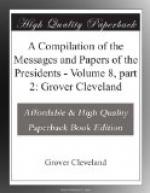Article XV.
Section 1. The right of citizens of the United States to vote shall not be denied or abridged by the United States or by any State on account of race, color, or previous condition of servitude—
Section 2. The Congress shall have power to enforce this article by appropriate legislation—
* * * * *
George Washington
April 30, 1789, to March 4, 1797
George Washington
George Washington was born at Bridges Creek, on the Potomac River, in Westmoreland County, Va., on the 22d day of February (or 11th, old style), 1732. Augustine Washington, his father, was a son of Lawrence Washington, whose father, John Washington, came to Virginia from England in 1657, and settled at Bridges Creek. Augustine Washington died in 1743, leaving several children, George being the eldest by his second wife, Mary Ball. At the early age of 19 years he was appointed adjutant-general of one of the districts of Virginia, with the rank of major. In November, 1753, he was sent by Lieutenant-Governor Dinwiddie, of Virginia, to visit the French army in the Ohio Valley on important business. War followed, and in 1754 he was promoted to the rank of lieutenant-colonel, and engaged in the war. In 1755 he acted as aid-de-camp to General Braddock. Soon after this he was appointed by the legislature commander in chief of all the forces of the Colony, and for three years devoted himself to recruiting and organizing troops for her defense. In 1758 he commanded a successful expedition to Fort Du Quesne. He then left the Army, and was married to Mrs. Martha Custis, a widow lady of Virginia. For sixteen years he resided at Mount Vernon, occasionally acting as a magistrate or as a member of the legislature. He was a delegate to the Williamsburg convention, August, 1773, which resolved that taxation and representation were inseparable. In 1774 he was sent to the Continental Congress as a delegate from Virginia. The following year he was unanimously chosen commander in chief, and assumed the command of the Continental Army July 2, 1775. He commanded the armies throughout the War for Independence. At the close he resigned his commission, December 23, 1783, and retired to private life. He was a delegate to, and president of, the National Convention which met in Philadelphia, Pa., in May, 1787, and adopted a new Constitution, that greatly increased the power of the Federal Government. He was unanimously elected the first President of the United States, and was inaugurated on the 30th of April, 1789, in New York City, and at the end of his first term was unanimously reelected. He retired March 4, 1797, having declined a third term. In September, 1796, he issued his Farewell Address to the people. July 3, 1798, he was again appointed to the command of the armies of the United States, with the rank of lieutenant-general. He was a Freemason, and served as master of his lodge. He died at Mount Vernon, Va., after a short illness, December 14, 1799, and was buried there.




